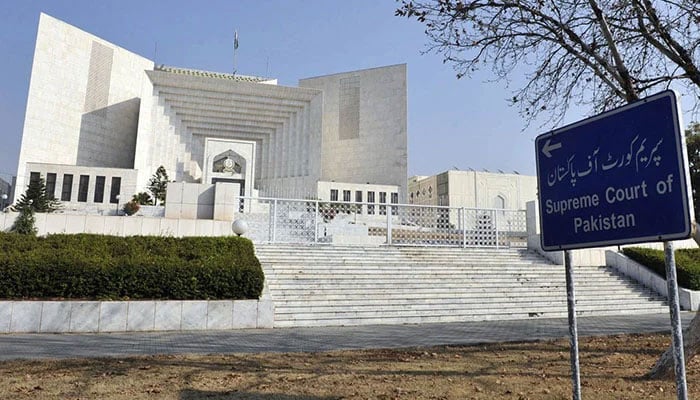Govt notifies law limiting top judge's powers
Three-member SC bench has been given power to take suo motu notice and form benches
ISLAMABAD: The government notified the Supreme Court (Practice and Procedure) Act, 2023 through the official gazette Friday.
The law, which curbs the chief justice of Pakistan's (CJP) powers to take suo motu notice and constitute benches, was deemed to have been given assent by President Dr Arif Alvi, according to the gazette notification.
The bill was passed by both the National Assembly and the Senate last month amid a standoff between the government and the judiciary over elections in Punjab and Khyber Pakhtunkhwa, after which it was sent to the president for assent.
However, President Alvi returned the bill for reconsideration to parliament, stating that it, prima-facie, "travels beyond the competence of parliament" and could be assailed as "colourable legislation".
The government then got the bill passed by a joint session of parliament on April 10 despite strong protest from the Pakistan Tehreek-e-Insaf (PTI), after which it was again sent to the president to sign. He refused to sign it once again.
Under the Constitution, if the head of the state does not give his approval to a piece of legislation within 10 days of it being passed by a joint session of parliament, it would be deemed to have been given.
However, an eight-member bench of the Supreme Court, while hearing petitions challenging the bill barred the government on April 13 from enforcing the law, saying that it would "prevent the imminent apprehended danger that is irreparable" as soon as the bill becomes an act of parliament.
Earlier today, the National Assembly also notified that the bill had become law.
What the Act says
The Supreme Court (Practice and Procedure) Act, 2023 gives the power to take suo motu notice to a committee of three judges, comprising the CJP and the two next most-senior judges. Prior to this act, the power to take suo motu rested solely with the chief justice.
It also takes away the CJP's power to form benches, which will now be constituted by a committee comprising the chief justice and the two most-senior judges after him.
The committee shall hold its first meeting soon after the Act's commencement to determine its procedures, including those related to forming benches and taking suo motu notices.
It further states that in cases related to the constitution's interpretation, the Supreme Court bench constituted to hear them will have at least five judges.
It gives the right to appeal a decision in a suo motu case, which will be fixed before a larger bench within 14 days. It also gives the right to appeal verdicts in such cases that were announced before the act's commencement, provided that the appeals are filed within 30 days.
It states that any application pleading urgency or interim relief will be fixed for hearing within 14 days.
-
Security forces gun down 30 terrorists in multiple IBOs in KP: ISPR
-
MQM-P calls for new province in Sindh
-
US report validates Pakistan military edge over India: PM
-
Banned TTP poses serious threat to Pakistan security: UNSC panel
-
CM Afridi clarifies remarks on by-poll after ECP requests army deployment
-
Dubai sees 3.2m Pakistani passengers in 2025 as airport sets new milestone
-
Security forces kill 23 Indian proxy terrorists in KP's Kurram
-
Pakistan to construct island to boost oil exploration: report












